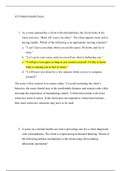-
1. Exam (elaborations) - Ati mental health chapters 1-32, question answers, homework, verified correct answer...
-
2. Exam (elaborations) - Ati mental health exam -1, verified correct answers-40 -qa
-
3. Exam (elaborations) - Ati - mental health practice assessment b - 2016, rn mental health practice b 2016 at...
-
4. Exam (elaborations) - Ati practice questions mental health exam 3 ----question answers
-
5. Exam (elaborations) - Ati mental health exam -2-verified correct answers
-
6. Exam (elaborations) - Ati mental health proctored (20 versions, 1600qa), best for exam, cover all question...
-
7. Exam (elaborations) - Ati mental health practice exam a---question answers, verified correct answers
-
8. Exam (elaborations) - Mental health ati final quiz-50 question answers, verified and correct answers, secur...
-
9. Exam (elaborations) - Ati rn mental health online practice 2016 b ---60 qa, verified and correct answers, s...
-
10. Exam (elaborations) - Ati mental health quiz 2-verified and correct answers, secure bettergrade-40qa
-
11. Exam (elaborations) - Ati rn mental health online practice 2013 a, verified and correct answers, secure bet...
-
12. Exam (elaborations) - Mental health practice 2016 a --qa, verified and correct answers, secure bettergrade
-
13. Exam (elaborations) - Ati mental health a--70qa, verified and correct answers, secure bettergrade
-
14. Exam (elaborations) - Mental health ati rn practice assessment 2019 b answers, verified and correct answers...
-
15. Exam (elaborations) - Mental health a--50 qa, verified and correct answers, secure bettergrade
-
16. Exam (elaborations) - Mental health final ati --50 qa, verified and correct answers, secure bettergrade
-
17. Exam (elaborations) - Ati mental health ati questions answers exam 1, verified and correct answers, secure ...
-
18. Exam (elaborations) - Pn mental health online practice b, verified and correct answers, secure bettergrade.
-
19. Exam (elaborations) - Pn mental health online practice 2017 a, verified and correct answers, secure highsco...
-
20. Exam (elaborations) - Ati mental health practice 2019 b, verified and correct answers, secure highscore
-
21. Exam (elaborations) - Mental health ati review-qa, verified and correct answers, secure highscore
-
22. Exam (elaborations) - Ati mental health b---70qa, verified, and correct answers, secure highscore
-
23. Exam (elaborations) - Ati rn mental health online practice 2013 b, verified and correct answers, secure hig...
-
24. Exam (elaborations) - Mental health question answers, verified and correct answers, secure highscore
-
25. Exam (elaborations) - Ati mental health 2019 b practice, verified and correct answers, secure highscore
-
26. Other - Mental health study guide exam 4, verified and correct answers, secure highscore
-
27. Other - Ati proctored mental health study guide, best document for preparation, verified and ...
-
28. Exam (elaborations) - Mental health ati proctored exam focused review, best document for preparation, verif...
-
29. Other - Ati mental health study guide, best document for preparation, verified and correct an...
-
30. Other - Notes for ati mental health-study guide, best document for preparation, verified and ...
-
31. Other - Mental health final study guide, best document for preparation, verified and correct ...
-
32. Exam (elaborations) - Nur 2488 mental health final exam review-rasmussen college
-
33. Other - Mental health final exam study guide – a
-
Show more




